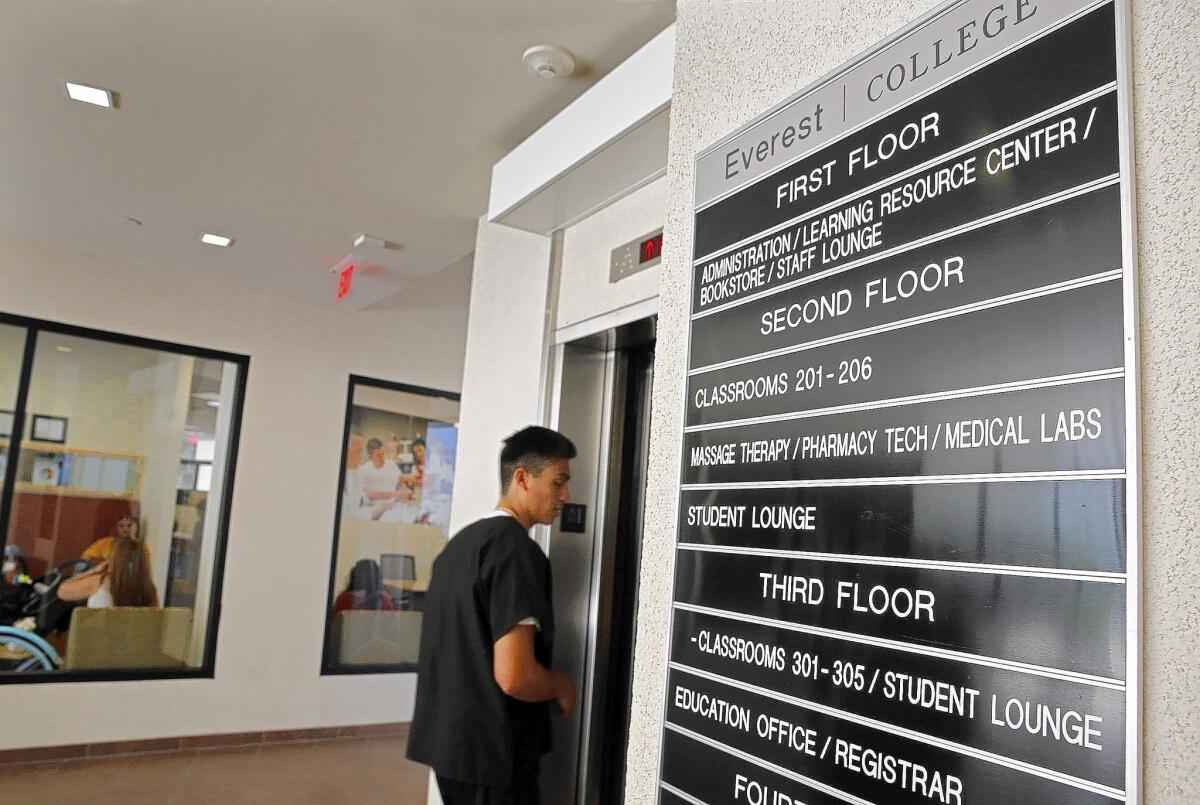Corinthian Colleges tells investors it is facing a criminal probe

- Share via
After months of financial uncertainty and battles with regulators, Corinthian Colleges Inc. told investors Wednesday about the prospect of a criminal investigation by federal prosecutors.
The beleaguered Orange County for-profit college company said in a filing that it received a grand jury subpoena from the U.S. attorney’s office in Los Angeles.
The subpoena requests a broad range of documents and records related to the company’s job placement rates, graduation rates and marketing materials used to recruit students. The Santa Ana firm has previously received subpoenas and similar document requests from state attorneys general, the Securities and Exchange Commission and the federal Consumer Financial Protection Bureau, but Wednesday’s announcement was the first to signal the possibility of a federal criminal inquiry.
The subpoena, issued Friday, is the latest in a string of headaches for Corinthian, which announced last month that it would sell 85 of its 107 campuses and online programs amid heightened scrutiny from the U.S. Department of Education.
A company spokesman, Kent Jenkins, said in a statement that Corinthian would cooperate with the request, but added that the company is prepared to “vigorously defend its policies, practices and track record of serving students effectively.”
Corinthian operates schools under the Everest College, WyoTech and Heald brand names. Nearly a quarter of the company’s campuses are based in California — more than any other state.
The for-profit college industry has faced greater scrutiny from federal and state authorities in recent years, as attorneys general and federal investigators allege that some schools are aggressively targeting low-income students who are eligible for the maximum in federal aid.
The Obama administration in March proposed new rules for the industry and other vocational schools that are intended to weed out bad actors that leave students with enormous debts and few job prospects.
Other companies have faced declining enrollments in recent years, but Corinthian’s recent troubles far outweigh those of its peers.
Over the last year, Corinthian has been inundated with investigations by state and federal authorities into its business practices, including concerns that employees falsified job placement rates and student attendance records to retain access to federal student loans and grants — the lifeblood of company profits.
The U.S. Department of Education set its sights on Corinthian in January, requesting extensive data and documentation to justify the company’s job placement rates. In June, the Education Department contended Corinthian had failed to provide the information as requested, and put a 21-day hold on the company’s access to federal student aid.
The sanctions put Corinthian on the brink of collapse. Last year, the company received nearly 85% of revenue from federal loans and grants.
In a June regulatory filing announcing the financial penalties, the company told investors it might have to shut down without additional funds. Amid declining enrollments and problems with an internal student lending program, Corinthian had already been struggling with cash flow this year.
In early July, Corinthian agreed to sell of most of its schools and close a dozen of them in a deal with U.S. education officials.
Patrick Fitzgerald, a former U.S. attorney in Chicago, is serving as an independent monitor overseeing Corinthian’s operations.
Corinthian is also facing a lawsuit filed by California Atty. Gen. Kamala Harris last October. Harris’ office alleged a wide range of fraudulent behavior, including having financial arrangements with temp agencies to count students as being “employed.” Job placement rates are a key marketing tool for recruiting new students, and are crucial to maintaining accreditation and access to federal aid.
That lawsuit is ongoing. Corinthian faced a similar lawsuit from the California Attorney General’s office in 2007. The company settled the case for $6.5 million, admitting no wrongdoing.
Jenkins, the Corinthian spokesman, said none of the ongoing investigations have proven “systemic wrongdoing or company-wide failure to comply with laws and regulations.”
“There has been no finding by any court of law that Corinthian has failed to meet any of its legal or regulatory obligations to students,” he added.
Felicia Gerard dropped out of an online bachelor’s degree program at Everest University last month, after she said she couldn’t get a straight answer about the company’s future from more than a dozen academic advisors. Gerard had already graduated from an Everest associate’s degree program last year, and said she reluctantly re-enrolled in the bachelor’s program after learning her credits would not transfer to Arizona State or other nearby public colleges.
“They just refused to tell me what was going on,” said Gerard, 29, of Mesa, Ariz. “They were just telling me things to shut me up and move me along, so they could get their money.”
Twitter: c_kirkham
More to Read
Inside the business of entertainment
The Wide Shot brings you news, analysis and insights on everything from streaming wars to production — and what it all means for the future.
You may occasionally receive promotional content from the Los Angeles Times.











